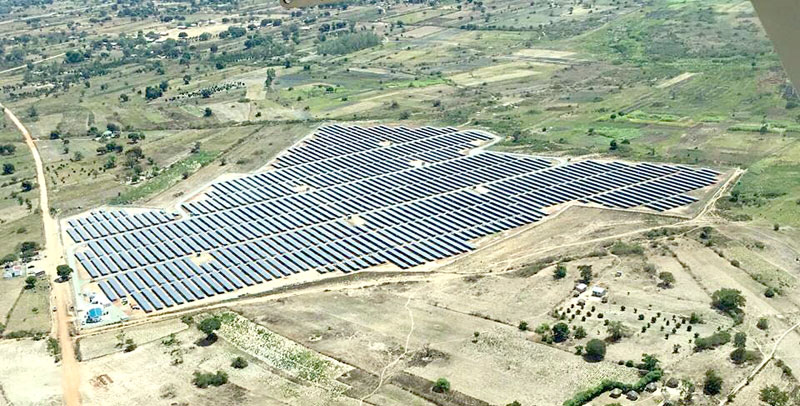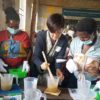Editor
Solar comes of age as prices fall by 200 percent

Access Power Plant in Soroti is the biggest in East Africa. Its success is a pointer that Solar is no longer a distant dream
The first solar power plant to join Uganda’s main power grid was recently unveiled in Soroti district, Eastern Uganda.
The new 10MegaWatt solar plant, a partnership between Access Power and EREN RE is said to have cost US$19m to build.
Promoters of the project say it will generate clean, low-carbon, sustainable electricity to 40,000 homes, schools and businesses in the area.
Made up of 32,680 photovoltaic panels, the new 10 megawatt facility at Soroti comes hot on the heals of Rwanda’s first and biggest solar park; an 8.5MW capacity plant that was launched in 2015.
Although Rwanda’s project came in a higher cost of US$23.5m, compared to Uganda’s, the launch of the two projects in a space of just two years points to the growing importance of Solar as a viable option for generating power in Africa.
In recent years, the cost of solar panels has dramatically fallen by about 200 percent between 2000 and 2015, according to experts from Singularity University, a Silicon Valley think tank that offers educational programs and a business incubator. This is in part thanks in part to China’s huge investments in the sector that has allowed the price of solar panels to reduce. Now experts say that the cost of generating power with solar has fallen below that of natural gas.
According to reports, Access Solar will sell power to UETCL at US 11 cents (about Ugshs 400/= per kilowatt hour. This is roughly the same amount that UETCL buys the same unit of power from Bujagali Energy Limited owned by Aga Khan. Although President Museveni vowed re-negotiate deal over the high cost of Bujagali’s powerl, to about 5 cents per kilo watt hour, his critics say the government has generally gotten bad deals from all its new hydro power deals including Karuma.
For many year, Hydro power was the only available viable renewable power option for Uganda since solar was too expensive. But with the dramatic fall in prices of energy from the sun, Hydro is getting its real competitor. In fact, in most villages across the country, the cries over lack of power are slowly disappearing thanks to the fact that solar have become more affordable.
According to the International Energy Agency, solar power accounted for 49GW (accounting for a third of newly installed renewable power) in 2015. In other words. This means that about half a million solar panels were installed every day around the world in 2015.
The growing importance of Solar is attracting funding agencies including the World Bank. Under the World Bank’s Climate Change Action Plan, $25 billion in private financing will be mobilized for clean energy in developing countries over the next five years, with another 30 gigawatts of renewable energy added either through direct investment or investments in enabling infrastructure by 2020.
A lot of the WB’s investment is targeting Asia, but this could be a wake up call for the content to start to mobilise funding through other avenues including the European Union’s GET FiT programme.
The Soroti Solar power project was developed under the Global Energy Transfer Feed in Tariff (“GET FiT”), a dedicated support scheme for renewable energy projects managed by Germany’s KfW Development Bank in partnership with Uganda’s Electricity Regulatory Agency (ERA).
It was funded by the governments of Norway, Germany, the United Kingdom and the European Union. The GET FiT programme helps renewable energy sources become more affordable and therefore more accessible in Eastern Africa.
European Union Head of Delegation to Uganda, Kristian Schmidt hailed the launch of the solar project as a result of a mixture of positive government policies and a conducive natural environment for solar power development.
Ambassador Schmidt said: “Uganda is a good place to invest in solar energy. The regulatory framework is conducive and Government rightly recognises Uganda’s energy future must be renewable. It is great that this is now triggering private sector interest in solar power generation. The European Union is proud that our grant contribution ensures the realisation of the Soroti Solar Plant, and I hope this is only just the beginning for many more to come.”
The ERA Chief Executive Officer, Eng. Ziria Tibalwa added: “We are so proud of this outcome of our stable and favourable regulatory environment that has produced such a leading project in the East African Region. We congratulate Access Solar and the people of Uganda upon this milestone.”
David Corchia, CEO, EREN RE, stated: “Soroti solar plant is an excellent textbook example of how collaboration among key local and international stakeholders can result in the successful execution and completion of such a ground breaking project and in tangible progress in the spread of renewable energy across Africa. We wish to express our gratitude and thanks to the organizations and individuals who made the construction of the largest solar power plant in East Africa possible.
Comments


















